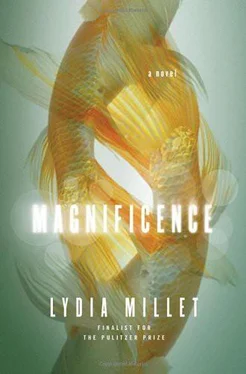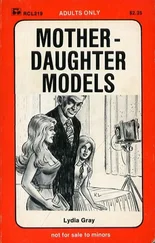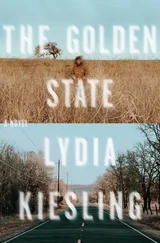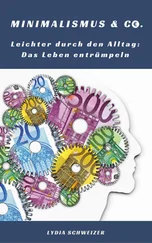She had to fix them in her memory. She wouldn’t be able to go into the room whenever she wanted to now and she resented it, though admittedly Oksana asked for almost nothing. The Russian even lacked her own bathroom; she’d have to walk down the hall to use the toilet or take a shower. The house was large but it wasn’t set up for assisted living.
Item 1: A coatimundi from Arizona needed repair; insects must have gotten to it recently because parts of the face looked mangy. Could be the larvae of carpet or fur beetles. . and there was mold on it, she guessed, either mold or mildew; ask the repair people, install a dehumidifier if need be. Item 2: One of the minks was incorrect, she had learned from a reference book in the library. The teeth were not its own. Possibly they had belonged to a housecat. Replace. Also the eyes were bulging. The wadding inside had likely expanded: another humidity problem.
“So I’ve paid Oksana’s wages in advance,” he was saying. “Angela has an ample allowance. Let Oksana handle her food, her bills, all that, the same way Vera did. Here’s hoping she’s capable. I’ll take a look at the debits and credits when I get back, but you shouldn’t have to be involved at all. That sound OK to you?”
“Fine, sure,” she murmured. She wondered if Oksana would be disturbed by the flash of canines at night, if, say, a car passed outside and illuminated the crouching raccoon. It held a half-bitten slice of lurid fuchsia watermelon, made of vinyl chloride.
Then again, she’d noticed, some people didn’t notice the faces; to some, like the young architect girl, the taxidermy was nothing more than a design element, albeit a misguided one.
“Where we’re going,” he said, “there won’t always be reliable telecommunication. Casey doesn’t want you to be worried.”
“I promise,” she said after a minute. “This time I won’t send anyone to track you down.”
•
Jim was spending more nights in the big house now. While he did not seem overjoyed by the arrival of Angela and Oksana, he was not displeased either; he liked the arbitrariness of their encounters, Susan thought. He was amused by the sight of Angela wandering into the kitchen at some odd hour of late night or early morning, her hair twisted up into a peach-hued turban, matching kaftan floating out behind her as she walked and a muddy facial mask with holes around her eyes and mouth. He smiled at Susan when Angela summoned him into the bathroom to remove a stray hair from the sink. He enjoyed her sporadic remarks about the hazards of all-American dining chains like Denny’s, to which she objected strenuously. It had to do with the portion size and the dominance of fried foods, apparently. Also the fact that the menus contained large photographs of each selection and were covered with plastic.
He found her humorous, Susan thought, despite the fact that her comedic value stemmed from mental decline. He was not worried about the moral dimensions of his entertainment.
Oksana also amused him. She represented an enigma.
“What’s with the lipstick all over the place,” he said after dinner one night, when the old women had gone to bed.
He and Susan were drinking wine in the backyard, watching helicopters cross the sky and listening to a chorus of far-off sirens. Jim liked the sound.
“Does she do it on purpose? It makes her look even crazier than the other one.”
“I think it was the fashion once,” said Susan. “To kind of draw on the contours of your upper lip. To make it look like you had, you know, these Cupid’s-bow lips.”
“Cupid’s bow?”
“With two, kind of, bumps on top? Like Lucille Ball or someone.”
“She wants to look like Lucille Ball? She looks like a bag lady. Seriously. With the dyed black hair that gets gray at the roots and the day-glo lips. We have a bag lady living with us. Are you sure she’s a nurse?”
“She’s not exactly a nurse. I don’t really know what she is.”
She dropped one of her shoes on the ground and trailed her bare toes in the pond water. She wondered if the fish would come nibble at them.
“Nothing wrong with a bag lady. It’s not a criticism, per se,” said Jim. “I’m just saying.”
“Yeah, don’t ask me,” said Susan vaguely. She was feeling the water, soft and cool as her foot swept through it. “All I care about is that Angela likes her.”
“So far,” said Jim. “Don’t get too comfortable.”
•
The dog came last. Casey and T. dropped her off the day before they left. They were booked on a series of flights to get to Borneo — through Hong Kong, Taipei, and Jakarta.
“I still don’t get what you’re going across the globe to do,” said Susan to Casey, standing talking to her through the window of the parked car while T. took the dog inside.
“His deal is, poor people that need to make a living, and then these dying-off animals,” said Casey. “He wants to make it so people don’t have a good reason to do things that kill the wildlife. So what there is, over there, is some kind of jungle forestry project. Community harvest of non-timber products is what they call it. It sounds so wonky, right? He’s trying to help these local guys set it up so the people can live off this one forest without cutting it or burning it down. There’s animals living there that need the forest. This Sumatran rhino that’s practically gone. Also orangutans and pygmy elephants. He loves those little fuckers.”
“So what are you going to do?”
“We’ve got this cabin lined up,” said Casey. “It’s primitive. No indoor toilets. But you can send faxes from this town that isn’t so far away, you just give them to the driver who comes out with food deliveries. Two times a week, they said. And sometimes we’ll go into town for errands and I can call you then. So my job? I’m going to handle the paperwork, to start with.”
“Huh. No toilets?” said Susan.
“Other priorities.”
“But what if. .”
“What if what,” said Casey.
“Health concerns,” said Susan. “The lack of pavement.”
“Oh please,” said Casey.
Susan saw her wheels caught in rainforest mud, her chair sinking into quicksand. It seemed wrong.
“All settled in,” said T., opening his car door and sliding behind the wheel. “She’s in my mother’s room right now.”
“T. How’s Casey going to get around, in Borneo?” asked Susan. “I’m serious. She has to have her independence. What about emergencies? Seriously. The jungle ?”
“Listen,” said T. “We don’t want you to worry. We bought her an all-terrain wheelchair. A power chair with these big wheels. She’s been practicing on it at the beach. But more to the point, the facility where we’re staying is part of a research-station complex. It has gravel paths between the buildings. A couple are even paved. It’s not all dirt.”
“It just doesn’t seem like an appropriate setting,” said Susan after a few seconds, anxious.
“Fuck appropriate,” said Casey.
“I don’t—”
“And fuck setting,” said Casey. “I’m not a lawn ornament.”
“Susan, you have my word,” said T. “If mobility is a problem, we’ll leave.”
“Don’t get all paternalistic just because we’re married,” said Casey. “If I want to leave I’ll say so. I have the power of speech.”
“Not what we meant,” said Susan.
“Yeah, yeah. I know. But I think you both get me.”
“OK,” said Susan. “OK. I just worry.”
“You don’t have to,” said Casey.
Susan stared down for a while and finally leaned in to kiss her on the cheek.
“Do my best, then,” she said.
She watched as the black Mercedes reversed, Casey waving out the open window, and pulled away.
Читать дальше












